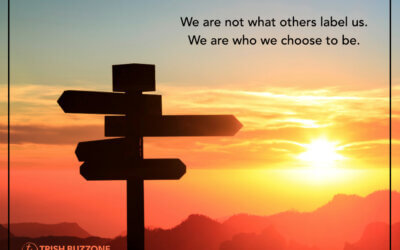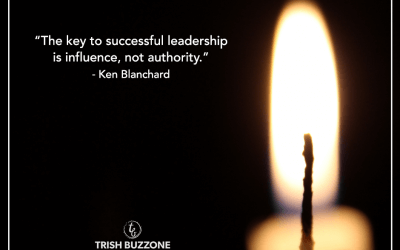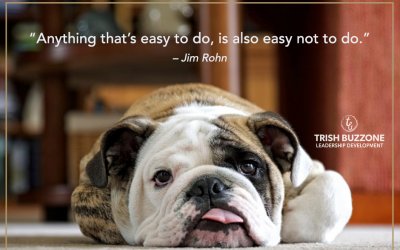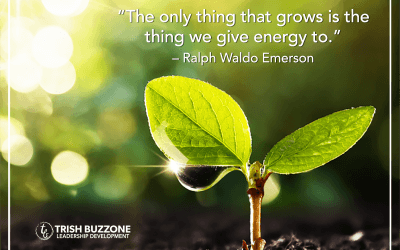Turn on the news during this pandemic, and examples of leadership, good and bad, are there for all the world to see. From local officials trying to balance the health of their constituents while protecting the future of their community; to military officers at odds over how to care for sick service members; to business leaders, small and large, trying to navigate their way through this crisis; to state and federal leaders balancing infrastructure needs with messages of hope.
Listen to one, and you find a leader living in the truth, offering comfort while delivering facts, actionable advice, and up-to-date information people need to make informed decisions in their own lives. These leaders are making sacrifices to bring people together, modeling what people need to see and hear in this time of crisis. Flip over to another channel and you find lack of clarity, obfuscation, and self-serving politics. A leader bragging about their personal wins, while placing blame and casting aspersions on other people.
These two scenarios are being played out in board rooms and offices, at clinics, bases, and ships and on conference calls across the world even as you read this. Leaders making decisions based on thinking that will inspire and motivate their people or push them closer to fear and anxiety.
As leaders, we all want to encourage and strengthen the people around us, especially in times of crisis when hope feels so distant. Where do we begin? How do we know if what we’re thinking and doing will motivate and inspire, or cause fear and distraction? John C. Maxwell offers this as a baseline:
“You know you’ll make the right decision when you put people first.”
When we put people first, we actively listen, strengthen connections, gain traction, and build momentum with a contagious vision informed by faith and energized with hope. As leaders in a crisis, we need to model this, living out an example that will help our team focus, connect, and move forward in unity.
This starts with us, because we’re more effective when we’re focused and healthy ourselves. In a world defined by the solitude of social distancing, we have a lot of time to think. What we choose to think about makes a huge difference.
In a crisis, if we’re not aware and not intentional, there are many things that may hijack our thinking. With the 24-hour news cycle almost entirely dedicated to pandemic coverage, delivered through every possible media option, just trying to separate the important data from the noise and the fear is exhausting. Trying to do so when our thinking is already clouded with fear and worry is even more taxing. Being effective leaders in a time of crisis begins with protecting our thoughts. We know this threat is real. We’re worried for good reasons, and we all need to be intentional about seeking wisdom and filling our minds with truth.
Experiencing worry and anxiety about living in a time of pandemic and what the consequences will be, now and in the future, is natural.
Many of us know people who are sick. Some of us know people who have died because of COVID-19. We’re all grieving. And, with the constant stream of conflicting and changing information, we’re all working out who to trust… and how much to trust them. Our faith in humanity, in the system, and in ourselves is being tested. Our team members are doing the same; and they’re looking to us while asking similar questions.
Prioritizing Self-Care
With all the distractions, all the fear and worry and stress, it’s hard to focus, especially when we feel responsible for others. Self-care slips down our list of priorities, even though we know taking care of ourselves is necessary for us to show up for our loved ones and those we lead. To help us be intentional about self-care, the CDC suggests these steps to manage the roller coaster of emotions and the weight of worry that comes with living through a crisis.
- Take breaks. Schedule them if you have to. Turn off the news, stop the flow of negative information. Step away from social media and completely unplug.
- Take time to breathe, stretch, and to meditate.
- Slow down, especially for meals. Eat a healthier, well-balanced diet.
- Exercise daily and get a good night’s sleep.
- Avoid self-medicating with alcohol or drugs.
- Relax. Do something that makes you smile and helps you focus.
To this, I would add:
- Share your concerns and fears with people who appreciate your honest, authentic self, in an environment where neither of you will make judgements.
- Be an intentional connector. Call family and friends, share something positive and ask them to do the same.
- Celebrate together. Grief will come, and being joyful together will help sustain us.
Focused, faithful, and connected
Right now, there is so much vying for our attention, fragmenting our focus and threatening to leave us scattered, distracted, worried, and apathetic. For most leaders, apathy is not a familiar state of mind. However, in a crisis, many people, including many leaders, just hit a wall. We experience a version of what caregivers call “compassion fatigue.” With so much continual stress and worry, coming from so many directions without a break, our natural desire to lead is slowly replaced with fatigue, boredom, and even cynicism.
All of this is exacerbated by the continual distractions. In addition to the task distractions we manage on a daily basis, we have additional mental, emotional, and financial worries… and, worse, we have no idea when we may experience relief. Most of us realize, on some level, our world is forever changed, and we don’t know what it will look like on the other side of this crisis.
Effective leaders are intentional about protecting, feeding, and encouraging their minds. We know that distractions are the actions that pull us away from all we want in life. We understand that gaining traction is the first step in building momentum toward that life, and yet all these distractions are happening that grab hold of us and pull us back. We break free and move forward when we:
- Strengthen connections to people and things that inspire and energize us
- Maintain focus on what we want our lives to be
- Remain faithful to our beliefs, truths we know will not change no matter the circumstances
- Practice intentional empathy
No matter how many times we are distracted, no matter how many times we slip off course, stand up, and start moving forward again. Focus on one thing and get it done. Do not allow the distractions, even other worthwhile tasks, to distract. Get that win and focus on the next. Encourage others to do the same, whether they’re working with us, for us, or on their own. Celebrate those wins and allow that joy to energize our momentum.
We know this crisis isn’t going anywhere, anytime soon, and that means stress, distraction, fatigue, and grief will still be with us. When we’re intentional about our focus, walking in truth, and keeping our life-giving connections strong, we will find our way through and show others how to do the same.
Creating the wake
I’ve been thinking about the emotional energy we exchange in our conversations and how this energy affects our relationships. That cause and effect reminded me of something I read in a book by Susan Scott called Fierce Conversations: “The conversation is...
“Once she labeled me”
Have you ever found yourself so angry with a friend or colleague, so shocked at what they said or what they did, that you wondered if your relationship could survive? Ginny found herself there after an ugly argument with an old friend. Her story, shared...
Pushing Through Most People’s #1 Fear
Pushing Through Most People’s #1 Fear How to respond when that voice inside whispers we’re not good enough Recently, a friend interviewed a successful marketing company CEO named Tomo about how he got his start as a writer and marketer. During the...
Dreams Are Not Fulfilled in a Vacuum
Dreams Are Not Fulfilled in a Vacuum The shift from doing our work to living our dream often involves connecting with the best in others My friend sat across from me, and I could tell she had something on her mind. I waited, watching this...
Everything Rises and Falls on Leadership
In the modern classic Disney film, Remember the Titans, one of the most pivotal scenes involves two talented, influential rivals coming to loggerheads over who is responsible for spreading toxicity on their team. When team captain Gerry Bertier confronts...
Do the Thing and Then You’ll Get the Energy
Do the Thing and Then You’ll Get the Energy Rediscover your purpose and motivation by releasing the kinetic power of strategic tension Recently, it’s been a struggle to find my motivation to get out and do things, even things I love to do. Based on some...
Planting seeds of transformation
Planting seeds of transformationTo experience real, powerful growth, I have to begin with myself In the song, Revolution, John Lennon pushes back against the idea that important growth only happens after people join larger movements. Revolution begins,...
Why I Value Thinking Partners
Why I Value Thinking PartnersTrusted people who encourage a higher level of awareness increase our capacity to think clearly, to act intentionally, and to lead effectively As we all transition into a world indelibly changed, much of the conversation around...
Where Our Focus Goes, Our Energy Flows
Where Our Focus Goes, Our Energy FlowsWhatever the circumstances, what we think and who we choose to be makes all the difference Sometime around March 2020, life as we know it went off the rails. As the number of coronavirus cases grew, businesses closed,...











0 Comments